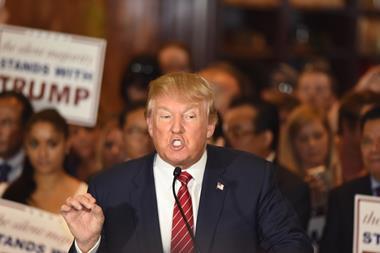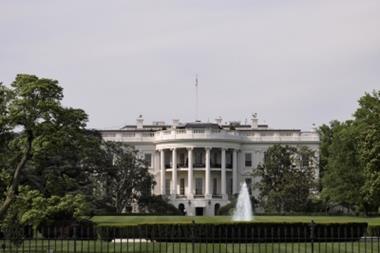With US trading relationships set to change considerably, businesses need to start reconfiguring their supply networks

While it is still early days, Donald Trump’s US presidency is already promising to be a game-changer for global trading relationships. Instead of waiting for decisions to be taken, businesses outside the US need to start reconfiguring their supply networks and rethinking their resource planning and manufacturing strategies to take account of what the future might hold.
During his election campaign, Trump did not hold back when talking about the changes he wanted to make to the way the US trades with the rest of the world. In particular, he promised to re-negotiate the North American Free Trade Agreement (NAFTA) and redefine trading relationships with China and Mexico; imposing punitive tariffs on imported goods from these countries. Since becoming President-elect, he has also demonstrated a willingness to act quickly by announcing America’s withdrawal from the Trans-Pacific Partnership, which had been awaiting ratification.
Ultimately, Trump’s goal is one of protectionism in his bid to ‘take back control’ of the US economy and businesses around the world that have invested time and money in developing efficient global supply chains will be forced to adapt to survive. In some instances, businesses that act quickly and demonstrate their ability to forge new trading relationships that are capable of delivering economic benefits to the US could even strengthen their position in the marketplace.
As they prepare for change, large multinationals and other businesses trading internationally will need to re-examine their approach to supply network design and take much greater notice of geopolitical risk factors. In the past, companies have been able to rely on relative geopolitical stability but with the on-going elections in the eurozone and Trump’s presidency getting under way, those days have gone. This global uncertainty is contributing to a higher incidence of more extreme currency fluctuations, which are disruptive operationally and can have a devastating effect on margins.
Interestingly, the tone of Trump’s presidency could influence supply chain behaviour in a more intrinsic way. His recent decision to cancel an order for the new Air Force One is indicative of the scrutiny that federal supply contracts could attract in the future. Backed by his commercial experience and business acumen, Trump decided the contract was simply too expensive. Similarly, he has recently expressed concern about the cost of other defence contracts, including Lockheed Martin Corp’s F-35 fighter jet programme. Clearly, manufacturers supplying goods to the US as part of defence or other federal contracts will be concerned that a similar degree of scrutiny will be applied to existing and new trading relationships in the future.
In the face of increasing geopolitical uncertainty and the unpredictability that accompanies Trump’s presidency, all businesses with established international trade agreements will need to adapt to become more agile so they can react to changes in a more timely way. They should start by stress-testing their supply chains to identify any potential issues. If they are exporting to the US, they will need to put in place contingency plans that are designed to protect key partnerships and appoint alternative suppliers to step in where required. If recent falls in the value of the pound are putting pressure on margins and making it harder for businesses to compete on price, they may need to consider sourcing more of their raw materials or components from the UK. If they are currently importing large volumes of goods from the eurozone or the US, British businesses could factor out the impact of exchange rate changes by outsourcing production to businesses based in countries that are already dealing in euros or dollars.
Taking this approach to outsourcing a step further, UK-based businesses that want to continue to supply the US marketplace could restructure their operational footprint in order to minimise the potential impact of tariffs and reduce tax liabilities. For example, they could seek to establish a new joint venture or other partnership with a manufacturing business based in the US, which might be responsible for late-stage customisation or other light manufacturing activity. Making these structural changes now could strengthen the company’s operational capacity and ensure the business can remain profitable once tariffs and new trading rules are introduced.
The risks posed by the new wave of US protectionism will be greater for some businesses than others. Manufacturers producing commodity products for the US marketplace, without owning any intellectual property rights, are more likely to be replaced in the future. However, those producing higher-value goods and services as part of trading agreements that give them some rights to market exclusivity are more likely to hang on to their export contracts. Taking this into consideration, businesses should consider whether a strategic IP review could be a timely opportunity to enhance their supply chain resilience.
Another important area for all businesses that want to minimise risk and continue to trade internationally in the future is accurate business information. Access to reliable business management data should be used to identify strategic cost-modelling opportunities and it is becoming increasingly critical in helping businesses to react to geopolitical and weather-related events. The ability to access data on a real-time basis will enable businesses to react in a more dynamic way; taking appropriate action swiftly and efficiently.
While Trump’s influence is bound to be incredibly disruptive for global supply chains, it could also bring opportunities for businesses that are well prepared and well informed. It is often said that fortune favours the bold and this has never been more true for businesses that are willing to rethink their trading relationships and build in offsets and incentives that will endear them to new world markets as they evolve. You never know how Britain’s ‘special relationship’ with the US might develop in the future and while free trade arrangements are unlikely to survive, there could be opportunities to translate international trade rules in a way that is mutually beneficial.




















No comments yet